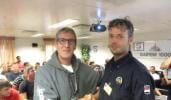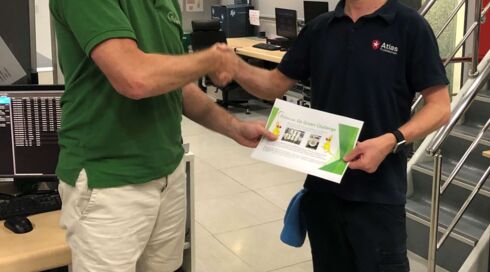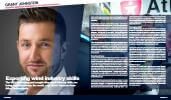25 September 2019
Through its office in Perth, Atlas Professionals hosts Indigenous Traineeship Programs. One of the trainees attending the program set in collaboration with Kotug is Broome-based Shannon Sibosado. Having now progressed to be a Provisional Integrated Rating (PIR), Atlas catches up with him to talk about his traineeship experience so far.
Shannon recently had his assessments books signed off by the Australian Maritime Safety Authority (AMSA), which is a major step to him getting fully qualified – he only has approximately 150 days of sea time left until he is a fully qualified Integrated Rating (IR). “I’ve thoroughly enjoyed the program so far and have learnt something new every day when at sea. Being at sea, I really enjoy being out on the water. I also love the extended time at home when on leave as well,” says Shannon, who originally was a tuna fisherman working out of South Australia. “Fishing remains something I love to do outside of work. It’s a great way to relax and there are always plenty of good fishing spots in Broome.”
The trainees enrolled in the Indigenous Traineeship Programs gain experience on different vessels, subject to availability of clients offering berths for the Deck Cadets or Trainee Integrated Ratings. The trainees get actively involved in learning about the safe operations and procedures of maritime operations, which include routine deck maintenance, mooring operations, the loading and discharging of deck cargo at offshore facilities and participation in onboard drills. For Shannon, this variation definitely has been an advantage: “Being able to gain experience on so many different vessels has opened my eyes to the fact that every day brings new challenges and rewards.”
Highlights and challenges
Seeing the Prelude, a FLNG (Floating Liquefied Natural Gas) facility producing natural gas off the coast of Australia, up close when onboard a supply vessel has been one of Shannon’s highlights during his sea time so far. “The size of it is truly amazing,” he says with a sparkle in his eyes. “Also seeing ROV (Remotely Operated Vehicles) operations up close on the back of a vessel is something I never thought I’d get to see. The technology and ability of ROVs is truly remarkable.”
Although he would not really call it a challenge himself, helicopter flights are not something Shannon lives for: “Helicopter flights aren’t the most enjoyable thing to do, to be honest. Also, the first few days onboard a new vessel it takes a while to get used to the new environment. Every vessel is different in some way and trying to remember everyone’s names always takes time,” admits Shannon.
Ambitions and advice
When asked where he sees himself in five years from now, Shannon is positive he will still be in the maritime industry. “I want to progress further with this great opportunity Atlas Professionals has provided me with. Working up to becoming a Chief Integrated Rating (CIR) is something I’m focused on and then, ultimately, I’d like to become a Deck Officer. Being a mentor to fellow Indigenous seafarers is something I’d like to do as well,” says Shannon.
Already offering some words of advice for future Indigenous Trainees, Shannon recommends them to be committed and open-minded. “Dedicate yourself 100% to all activities and take on any challenge with a positive attitude. Listen and learn from those that are experienced in the task you’re learning and – most importantly – remain safety focussed.”
If you would like further information about this partnership or have a berth available for a Deck Cadet or Trainee Integrated Rating, please contact seafarertraining@atlasprofessionals.com.au.
.png)
.png)


